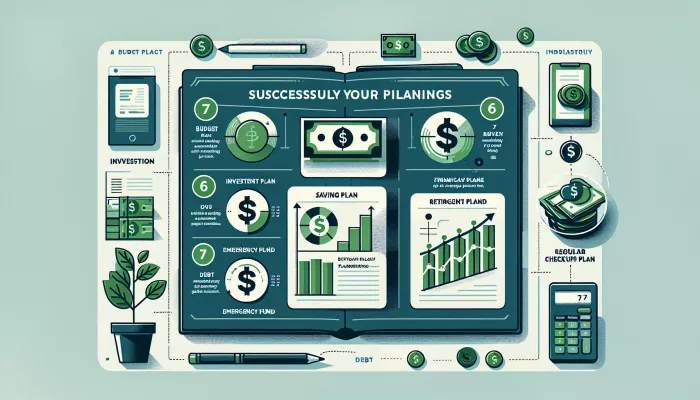

Setting realistic financial goals is essential to any financial health plan. Here are some steps to help you on this journey:
First of all, it is crucial to identify what is most important to you.
It could be buying a house, educating your children, taking a dream trip or retiring.
These priorities will guide all your financial decisions.
For your financial goals to be achievable, they must be: Specific, Measurable, Achievable, Relevant and Timely (SMART).
For example, instead of saying “I want to save money”, say “I want to save R$5,000 for a trip in two years”.
An understanding intimate of your current cash flow is essential. This includes knowing how much you earn, spend and save. Use this diagnosis to adjust your goals, making them more realistic.
No financial plan is without obstacles. It's wise to have an emergency fund to deal with unforeseen events without jeopardizing your long-term goals.
Your financial plan is not static. Life changes, and your financial goals should evolve with these changes.
Periodically review your goals to ensure they remain aligned with your priorities.
Setting and following realistic financial goals is an ongoing process of self-knowledge, discipline and adjustments.
With the right planning and tools, you can achieve your goals and establish solid financial health.
Saving money is not just a task, it's an art! With smart strategies, you can maximize your savings and build robust financing for the future.
Let's dive into some tried and true techniques.
Automate your savings is like putting your financial progress on autopilot.
When you set up an automatic transfer from your checking account to your savings Right after you receive your salary, you are guaranteed that a portion of your money will be saved before you even have a chance to spend it.
It's the perfect strategy for those who have trouble remembering to save.
Use the principle of Budget 50/30/20 to manage your finances. This rule suggests that you should allocate:
This strategy helps maintain a good balance between spending, savings and leisure.
Reevaluating your monthly expenses and cutting out what's unnecessary can free up a significant amount of money.
This includes unused subscriptions, frequent dining out, and impulsive spending. Use a spreadsheet or personal finance app to track your spending and identify where you can cut back.
Credit cards and shopping apps that offer rewards or cashback can be powerful allies.
When you use these payment methods for necessary purchases, you can accumulate points or receive a percentage of cash back, which contributes to your savings over time.
To adopt savings challenges It can be a fun and effective way to increase your savings.
Challenges such as saving all your spare change for a month, the no-spend-one-day-a-week rule or the 52-week challenge,
increasing the amount saved each week, these are exciting and motivating options.
Remembering that the journey to saving money is personal and unique. Test different strategies to find out which ones work best for you and your lifestyle.
The key is to get started, be consistent, and adjust your plan as needed.
To manage and monitor your finances, you can use applications such as YNAB (You Need A Budget) or Mint, which are incredible tools for keeping your finances organized and optimizing money savings.
Track your financial progress It’s critical to ensuring you’re on track to achieve your goals.
The good news is that with the right tools and techniques, this process can become accessible and even motivating.
Below, we explore some of the best practices and tools available to help you keep your finances under control.
Currently, there is a variety of applications and online platforms that make it easier to monitor your budget and investments.
These tools can sync your bank accounts, classify your expenses, and even offer insights into your spending habits.
Apps like Mint, YNAB (You Need A Budget), and Personal Capital are highly recommended and offer a clear overview of your financial position.
Useful links:
Staying motivated can be a challenge, especially if you don't see immediate progress. Celebrate small achievements,
maintain a financial diary, and having a financial accountability partner can make the journey more enjoyable and sustainable.
Using the right tools and techniques can transform the way you manage your finances, turning potential stress into an enriching experience.
Start implementing these practices into your financial life today and see how far you can advance towards your financial goals.